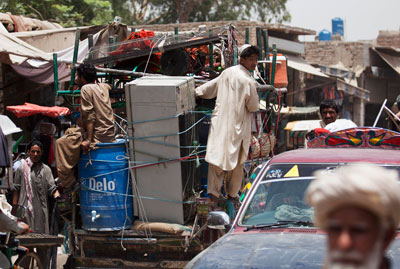CPJ received an email message from the Tehreek-e-Taliban Pakistan– the Pakistan Taliban–this morning. Signed by the “Media commission, Tehreek-e-Taliban Pakistan Mohmand agency,” the message was addressed to CPJ and our colleagues at Reporters Without Borders.
The message is headlined, “The Global war of ideologies and the behavior of media: To the heads and members of the organizations working for the rights of media members around the world” and lays out the TTP’s anger with Pakistani media coverage of the military’s anti-insurgency campaign in Waziristan, ongoing since early June.
The campaign is known as Zarb-e-Azb, which translates into “strike of the Prophet’s sword,” and the army calls it a “comprehensive operation.” The offensive is bloody, as will be the case when military forces go into civilian areas to root out insurgents. There has been a fairly high death count, lots of destruction of homes, and a large number of displaced civilians. The proverb “When elephants fight, it is the grass that gets trampled,” is especially true in this conflict.
Not for the first time, Pakistan’s military has made independent media coverage of the fighting extremely difficult, though not impossible. Because of the restricted coverage, the TTP is accusing the Pakistani media of betraying its journalistic mission by behaving “towards us in this battle in such a way that is even against its own principles. To spread false and baseless news, make propaganda against us on behalf of our enemies and playing the role of war propagandists,” the Taliban considers to be “irresponsible, thoughtless and criminal behavior.”
My interpretation is that the TTP is losing the media battle to present its side of the conflict, and is not pleased with the situation. Given that the fighting doesn’t look to end any time soon, and the government is dominating the news flow from the battlefield, the TTP is threatening to take its frustrations out on Pakistani journalists in an attempt to reverse the information war it is losing.
The threat to us, and Reporters Without Borders and our other sister groups, is not as menacing as the threat directed toward journalists in the TTP’s message. It seems to signal that there will be more attacks on the media, most likely in the near future: “This message is aimed at making you aware that if we get engaged in attacking them [the media] then no crying and sobbing will be heard and we think accomplishing our legitimate and decent mission without attending to criticism of any criticizer is our appropriate right.” In other words, media support groups like CPJ shouldn’t start complaining when the TTP starts attacking journalists. The apparent threat to us and our international colleagues seems clearest with the statement, “We want to remind you that we always remember our enemies.” We should not criticize the TTP by “crying and sobbing,” that is to say, by doing our job of supporting Pakistani journalists.
The TTP has always been media savvy, if not always media friendly. Their spokesmen are readily available and return calls quickly, and the groups maintain websites and social media accounts for both publicizing their victory claims and recruiting. This sort of message is not unlike them.
For their part, Pakistani journalists have long been under pressure from every group with a political or criminal agenda in the country–the military and intelligence agencies, the many militant groups (including the TTP), political parties, local strongmen, and criminal thugs. We have written about how journalists are under constant threat no matter what their political slant, and how they can be harassed, abducted, beaten, and killed with near-perfect impunity.
So as a service to our Pakistani colleagues in the media we will pass along this latest threat, one in a steady never-ending stream of threats, from a group with the power to wreak real mayhem and murder. For almost all of colleagues, it’s not the first time they will be threatened. And just as journalists in Pakistan will keep doing their jobs, CPJ will keep on publicizing the attacks on them from any quarter, drawing attention to the increasingly unstable situation in which they find themselves.
